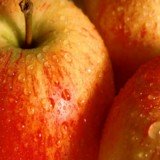Watermelon Nutrition Facts
Watermelon Nutrition Facts and Health Benefits
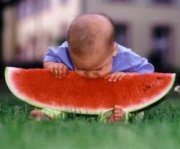 The watermelon is one of the best summer fruits there is. It's ironic that they are named so as they contain about 92% water. This is why they also make a great summer fruit as they will aid with dehydration and quenching thirst in the heat. It can be enjoyed by people of all ages, having a crunchy, juicy flesh.
The watermelon is one of the best summer fruits there is. It's ironic that they are named so as they contain about 92% water. This is why they also make a great summer fruit as they will aid with dehydration and quenching thirst in the heat. It can be enjoyed by people of all ages, having a crunchy, juicy flesh.
There are said to be more than 1,200 different types of watermelons. Seedless watermelons are one of the varieties of watermelons. Although they are named so, they are not necessarily seedless. They have tiny seeds which some people consider to be edible. Seedless watermelons in particular are said to contain high levels of lycopene.
Lycopene is the natural plant pigmentation that gives all the red fruits and vegetables their distinct red coloration. It's the lycopene in watermelons that makes them reduce the risk of different types of cancer, especially prostate cancer. It has been found that watermelons are the only fruit that contain the highest amount of lycopene, as compared to other fruits and vegetables. Watermelons also contain Dietary Fiber, Protein, Vitamin C, Vitamin A, Iron, Calcium. Thiamin, Riboflavin, Niacin, Potassium, Magnesium, Folate, Pantothenic Acid, Phosphorus, Copper, Manganese and Zinc.
Watermelon Health Benefits
So what are the health benefits we get from consuming watermelons? Why should we include them in our healthy eating diet? Some people also eat the watermelon rind. Although most people are turned away by its not so great flavor. Nutrition facts on watermelon rind are covered a bit further down this article. As we have mentioned earlier, watermelons contain high amounts of water. This gives your body quite a bit of health benefits. For one, this in the hot summer sun would help to prevent heat strokes, as well as re-hydrating your body and quenching your thirst. This high water content also means that you will be making frequent trips to urinate. This in itself is a way of cleaning your kidneys.
Speaking of kidneys, because watermelons are rich in Potassium, one of their health benefits is targeted towards the kidneys. Potassium is one of the minerals that aids in cleaning the kidneys by washing off toxic depositions in the kidneys. It also helps in reducing uric acid concentration in the blood as well as reducing heart attack risks. Potassium, together with Magnesium also aid in reducing high blood pressure. These two minerals again aid in the proper functioning of insulin in the body, lowering blood sugar levels in the process. One other thing about watermelons is that they are rich in B Vitamins which are important for energy production.
Watermelons are also a good source of the antioxidants Vitamin C and A. Antioxidants fight against free radicals which are harmful to our bodies. We will now take at some watermelon nutrition facts of different kinds of watermelons, prepared in different ways. The percent daily values (DV) are based on a 2,000 calorie diet. This therefore means that your values may differ depending on your daily calorie needs.
Raw Watermelon Nutrition Facts
Raw watermelon nutrition facts reveal that they are moderate in terms of calories. They are a very good source of Vitamin A and an excellent source of Vitamin C. These are two very important antioxidants that we can have in our bodies. Antioxidants fight against free radicals that can have several harmful effects in our bodies. They are also the agents responsible for wrinkles on the skin.
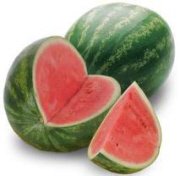
- Serving size- 1 NLEA serving, 280g
- Calories- 84
- Calories from Fat- 4
- Total Fat- 0g
- Saturated Fat- 0g
- Cholesterol- 0mg
- Sodium- 3mg, 0% of DV
- Total Carbohydrate- 21g, 7% of DV
- Dietary Fiber- 1g, 4% of DV
- Sugars- 17g
- Protein- 2g, 3% DV
- Vitamin A- 32% of DV
- Vitamin C- 38% of DV
- Calcium- 2% of DV
- Iron- 4% of DV
- Thiamin- 6% of DV
- Riboflavin- 3% of DV
- Niacin- 2% of DV
- Vitamin B6- 6% of DV
- Folate- 2% of DV
- Pantothenic Acid- 6% of DV
- Magnesium- 7% of DV
- Phosphorus- 3% of DV
- Potassium- 9% of DV
- Copper- 6% of DV
- Manganese- 5% of DV
- Selenium- 2% DV
Sour Patch Watermelon Nutrition Facts
Sour Patch Candy watermelon nutrition facts show that it obviously contains quite a bit of sugar and is moderate-high in terms of calories. This is expected of candies as they mostly contain sugar. These should be consumed once in a while in order to avoid the the effects of having too much sugar in your system such as diabetes or obesity and the like.

- Serving size- 40g
- Calories- 150
- Calories from Fat- 0
- Total Fat- 0
- Saturated Fat- 0g
- Cholesterol- 0mg
- Sodium- 25mg, 1% of DV
- Total Carbohydrate- 37g, 12% of DV
- Dietary Fiber- 0g
- Sugars- 26g
- Protein- 0g
Seedless Watermelon Nutrition Facts
Seedless watermelons, though named so, are not wholly seed-free. They contain small white seeds which are considered to be edible by most people. Nutrition facts of seedless watermelon tell us that they are low in calories and do not contain any fat, cholesterol and are low in sodium. They are a good source of Vitamins A and C as well as being a source of Dietary Fiber, Calcium and Iron.
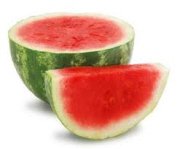
- Serving size- 154g
- Calories- 46
- Calories from Fat- 0
- Total Fat- 0g
- Saturated Fat- 0g
- Cholesterol- 0mg
- Sodium- 2mg, 0% of DV
- Total Carbohydrate- 12g, 4% of DV
- Dietary Fiber- 1g, 4% of DV
- Sugars- 10g
- Protein- 1g
- Vitamin A- 18% of DV
- Vitamin C- 21% of DV
- Calcium- 1% of DV
- Iron- 2% of DV
Watermelon Nutrition Facts: Juice
Watermelon juice nutrition facts reveal that it is a good source of Vitamin A and an excellent source of Vitamin C, providing you with 38% of your recommended daily allowance. One of the things that Vitamin C does is to aid your immune system to fight against infections that may want to attack your body.
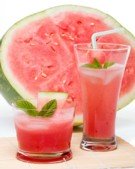
- Serving size- 1 cup
- Calories- 76
- Calories from Fat- 9
- Total Fat- 1g, 2% DV
- Saturated Fat- 0.1g, 1% DV
- Cholesterol- 0mg
- Sodium- 5mg, 0% of DV
- Total Carbohydrate- 17g, 6% of DV
- Dietary Fiber- 1.2g, 5% of DV
- Protein- 1.5g, 3% DV
- Vitamin A- 17% of DV
- Vitamin C- 38% of DV
- Calcium- 2% of DV
- Iron- 2% of DV
- Vitamin E- 1% DV
- Thiamin- 10% of DV
- Riboflavin- 2% DV
- Niacin- 2% DV
- Folate- 1% DV
- Vitamin B6- 17% of DV
- Phosphorus- 2% DV
- Magnesium- 7% of DV
- Potassium- 8% of DV
- Copper- 4% of DV
Watermelon Nutrition Facts: Seeds
These are nutrition facts of dried watermelon seeds. Amazingly, they are very high in calories, total fat and saturated fat. They do not contain both Vitamins A and C and Dietary Fiber. They are however a good source of Thiamin, Niacin, Folic Acid and Potassium. Another great thing about watermelon seeds is that they are an excellent source of Protein, Iron, Magnesium, Phosphorus, Zinc, Copper and Manganese. These are all essential minerals and nutrients for our bodies.
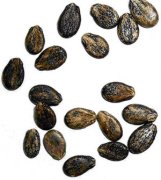
- Serving size- 108g
- Calories- 602
- Calories from Fat- 428
- Total Fat- 51g, 79% DV
- Saturated Fat- 11g, 53% DV
- Trans Fat- 0g
- Cholesterol- 0mg
- Sodium- 107mg, 4% DV
- Total Carbohydrate- 17g, 6% of DV
- Dietary Fiber- 0g
- Sugars- 0g
- Protein- 31g, 61% DV
- Vitamin A- 0% of DV
- Vitamin C- 0% of DV
- Calcium- 6% of DV
- Iron- 44% of DV
- Thiamin- 14% DV
- Riboflavin- 9% DV
- Niacin- 19% DV
- Vitamin B6- 5% DV
- Folate- 16% DV
- Pantothenic Acid- 4% DV
- Magnesium- 139% DV
- Phosphorus- 82% DV
- Potassium- 20% DV
- Zinc- 74% DV
- Copper- 37% DV
- Manganese- 87% DV
Watermelon Nutrition Facts: Rind
Watermelon Rind nutrition facts show that it is very low in calories and is a source of Vitamin C and Dietary Fiber. Watermelon rind has been found to be especially helpful to include in the pregnancy diet of expecting mothers. This is because it aids them to stock up on essential, important vitamins and minerals.
It also reduces heart burn or acid reflux, alleviates morning sickness and dehydration as well as reducing swelling. If you are in your third trimester, watermelon rind aids in reducing muscle cramps. Watermelon rind is a very good source of Vitamins A, C and B6, Magnesium and Potassium.
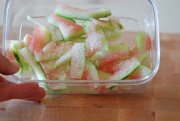
- Serving size- 1 square or cube
- Calories- 2
- Calories from Fat- 0.1
- Total Fat- 0
- Saturated Fat- 0g
- Cholesterol- 0mg
- Sodium- 0.2mg, 0% of DV
- Total Carbohydrate- 0.32g, 0% of DV
- Dietary Fiber- 0.2g, 1% DV
- Protein- 0.2g
- Vitamin A- 0% of DV
- Vitamin C- 2% of DV
- Calcium- 0% of DV
- Iron- 0% of DV
- Thiamin- 10% of DV
- Vitamin B6- 1

